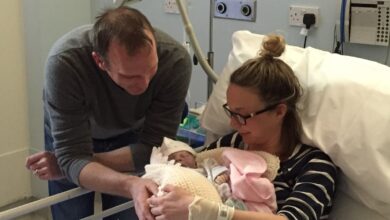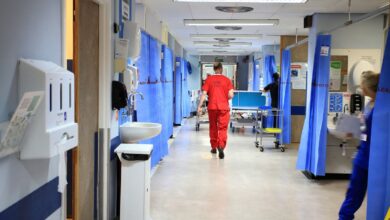Shrewsbury maternity scandal: NHS trust blamed mothers as hundreds of babies died avoidably, report finds

Mothers were blamed for the avoidable deaths of more than 200 babies at Shrewsbury and Telford Hospital Trust, an inquiry into the largest maternity scandal in NHS history has found.
A damning report published on Wednesday said the trust presided over decades of catastrophic failings, while it was never challenged over practices which led to hundreds of children being stillborn, dying shortly after birth or being left severely brain damaged.
In some cases, fault for the death of babies was placed on mothers, while others had their concerns and complaints dismissed, compounding their grief at losing a child.
Babies also died during birth and shortly after due to a culture of a “reluctance to perform caesarean sections”, the report found.
The inquiry, led by chair Donna Ockenden, covered 1,592 clinical incidents involving 1,486 families between 2000 and 2019,
It is the largest report into the maternity failings to date and comes two years after The Independent revealed more than a dozen women and more than 40 babies died during childbirth at Shrewsbury and Telford Hospital Trust because of a culture that denied women choice.
The inquiry found there were a total of 295 avoidable baby deaths or brain damage cases as a result of poor maternity care, including 131 stillbirths, 70 neonatal deaths and 84 cases of brain damage.
It said nine mothers had also died as a result of avoidable poor care. Concerns were raised about a further three deaths, although it was determined care had not been a factor in these outcomes.
Conservative MP Jeremy Hunt, who ordered the inquiry in 2017 when he was health secretary, said on Wednesday the numbers were “worse” than he could have imagined and he hoped the report would be “a wake up call”.
Ms Ockenden, a senior midwife, said: “Throughout our final report we have highlighted how failures in care were repeated from one incident to the next. For example, ineffective monitoring of fetal growth and a culture of reluctance to perform caesarean sections resulted in many babies dying during birth or shortly after their birth. In many cases, mother and babies were left with life-long conditions as a result of their care and treatment.
“The reasons for these failures are clear. There were not enough staff, there was a lack of ongoing training, there was a lack of effective investigation and governance at the Trust and a culture of not listening to the families involved. There was a tendency of the Trust to blame mothers for their poor outcomes, in some cases even for their own deaths.
“What is astounding is that for more than two decades these issues have not been challenged internally and the Trust was not held to account by external bodies. This highlights that systemic change is needed locally, and nationally, to ensure that care provided to families is always professional and compassionate, and that teams from ward to board are aware of and accountable for the values and standards that they should be upholding.”
The report contains more than 60 recommendations for Shrewsbury and Telford Hospital Trust, as well as calling for NHS England to commit to a multi-year investment plan for maternity workforce with minimum staffing levels to be agreed nationally and locally.
Louise Barnett, chief executive at the Shrewsbury and Telford Hospital NHS Trust said: “Today’s report is deeply distressing, and we offer our wholehearted apologies for the pain and distress caused by our failings as a trust.”
Speaking on Wednesday as she presented the report’s findings, Ms Ockenden said her review team were told by staff at the trust they were “fearful” to speak out.
The report covers 1,486 clinical incidents, most of which took place between 2000 and 2019
One staff member reportedly told the inquiry: “We were told not to speak out, but I will do it and take the consequences because it is the right thing to do.”
The scandal first came to light after bereaved families spoke out over treatment they had received at the trust.
Richard Stanton and Rhiannon Davies, who have campaigned for years over the poor care, lost their daughter Kate hours after her birth in March 2009.
The trust noted the death but described it as a “no harm” event, although an inquest jury later ruled Kate’s death could have been avoided. The trust still insisted its care had been in line with national guidelines.
Rhiannon Davies campaigned for years over poor care at Shrewsbury and Telford Hospital Trust





